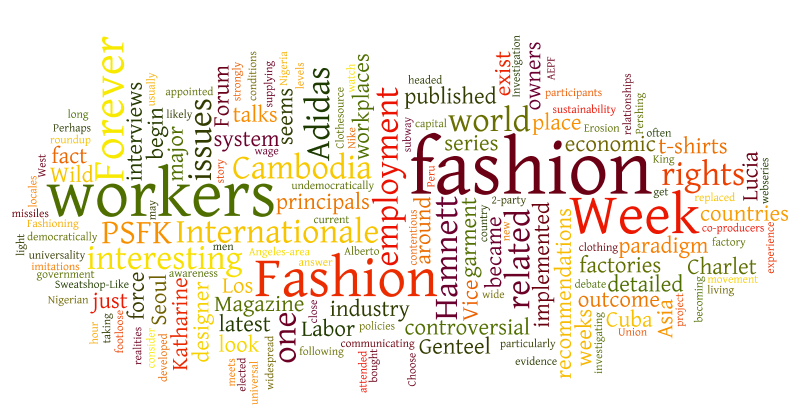The Social Alterations team is constantly coming across interesting content from a wide variety of sources. This is a curated selection of thought provoking reading we’ve done in the past month related to responsible fashion.
∆∆∆∆∆∆
§ Let’s begin with designer interviews: one well-established and one up-and-coming. Katharine Hamnett talks with The Wild Magazine about her journey to fashion and sustainability, while The Genteel interviews Lucia Cuba on her controversial collection that reflects her passion for socio-political issues in her homeland, Peru.
“Katharine Hamnett is most famous and recognized for her slogan t-shirts that became wildly popular in the 1980s, bearing slogans such as “Choose Life” and “58% Don’t Want Pershing” (missiles). The statement t-shirts became so widespread that they were copied by nearly everyone in the industry. Perhaps surprisingly, Hamnett welcomed the imitations (The Wild Magazine).”
“Under the birth control policies implemented by President Alberto Fujimori’s government, hundreds of thousands of Peruvian men and women were forcibly sterilised over a four-year period in the late-1990s. Amanda Coen looks at how fashion designer and social activist, Lucia Cuba, is raising awareness of this highly contentious subject through her latest project, ARTICULO 6 (The Genteel).”
∆∆∆∆∆∆
§ On the sweatshop front, Forever 21 faces an investigation which reminds us that worker issues exist in ‘developed’ countries as well. Meanwhile, although I personally don’t agree with the strategy, some universities have severed their contracts with Adidas.
Forever 21 Under Investigation For Using ‘Sweatshop-Like’ Factories In Los Angeles
“The leggings you just bought at Forever 21 may have more problems with them than an excess of sequins. According to the U.S. Department of Labor, Forever 21 clothing is being produced in “sweatshop-like conditions” by workers in Los Angeles-area factories, the agency said in a press release on Thursday (The Huffington Post).”
Universities Dump Adidas Over Labor Disputes
“In its reckless quest to overtake Nike in the sportswear market, Adidas built a footloose global supply chain to force its factories into cut-throat competition (The Nation).”
∆∆∆∆∆∆
§ The second season of Vice’s Fashion Week Internationale, a webseries investigating the under-reported fashion weeks in overlooked locales from Cambodia to Nigeria. Vice steps behind the catwalk to look at the realities that exist around fashion and the industry in these countries. PSFK interviewed Charlet Duboc, correspondent and co-producers of the series. I’ve also added a link to the latest episode which just happens to take place in South Korea, a country that’s close to my heart. I strongly encourage you to watch the other episodes, particularly the one about Cambodia. Fascinating! Especially in light of the events that have been taking place there related to garment workers and the living wage debate.
Why don’t we ever hear about Nigerian Fashion Week?
“PSFK talks to the co-producer of Fashion Week Internationale, a VICE series, about communicating the controversial and often unreported issues surrounding under the radar fashion weeks from around the world (PSFK).”
“Fashion Week Internationale lands in Seoul, the technology and entertainment capital of East Asia. Charlet tries and fails to understand why people there shop at 4 AM, gets a makeover on the subway, and meets Donald King, the loneliest punk in the world (Vice).”
∆∆∆∆∆∆
§ The Asia Floor Wage Cambodia published a post on their facebook page that detailed the outcome of the 9th Asia-Europe People’s Forum (9AEPF). Charles Hector reported the following:
“What was interesting was the outcome of the workshop entitled “Combating Erosion of Worker and Trade Union Rights”, which was attended by about 80-100 participants, who did at the end of the 3 1/2 hour program on the 18th afternoon come up with recommendations, all of which were discussed and adopted unanimously….
The call was for the abolition of outsourcing [i.e. the contractor for labour system], and short-term employment contract.
Regular employment with security of tenure until retirement
∆∆∆∆∆∆
§ And finally, Mary wanted me to add this article to the roundup: Mike Flanagan (Clothesource) questions the universality of workers’ rights in a recent “Flanarant” for Just Style.
Workers’ rights not a universal option
“Anyone believing that human rights abuses are endemic in offshore production should compare the levels of protection afforded to factory workers in the developing world supplying major Western brands with the experience of garment workers in the West. It’s not as clear-cut as it seems (JustStyle).”






